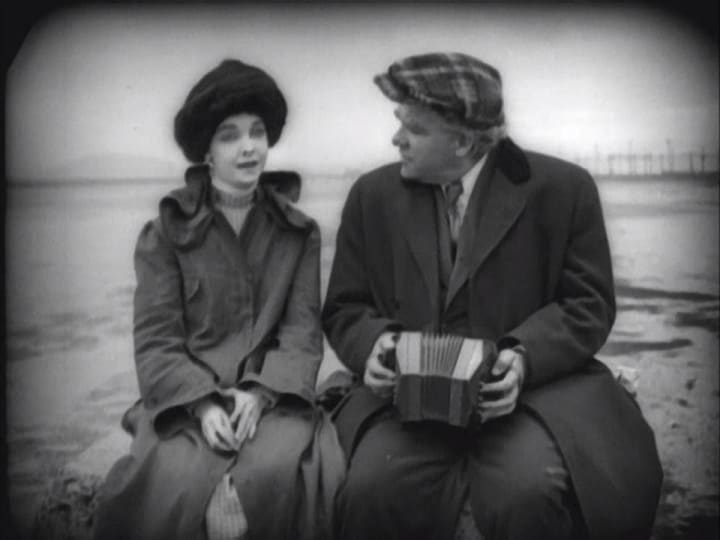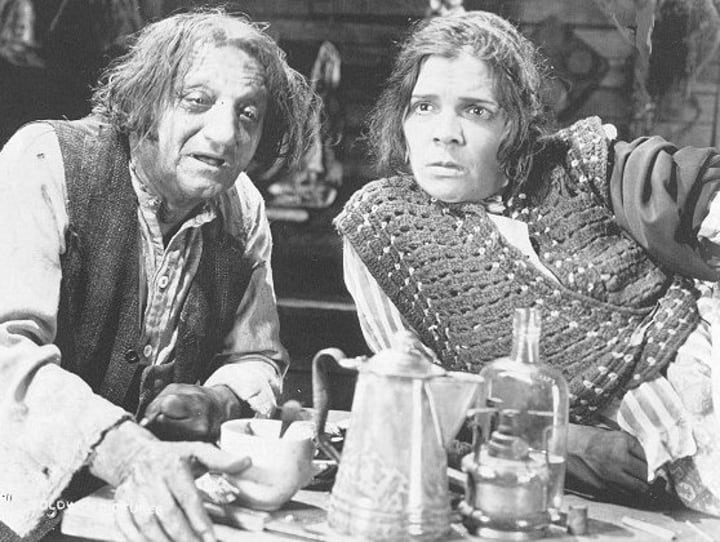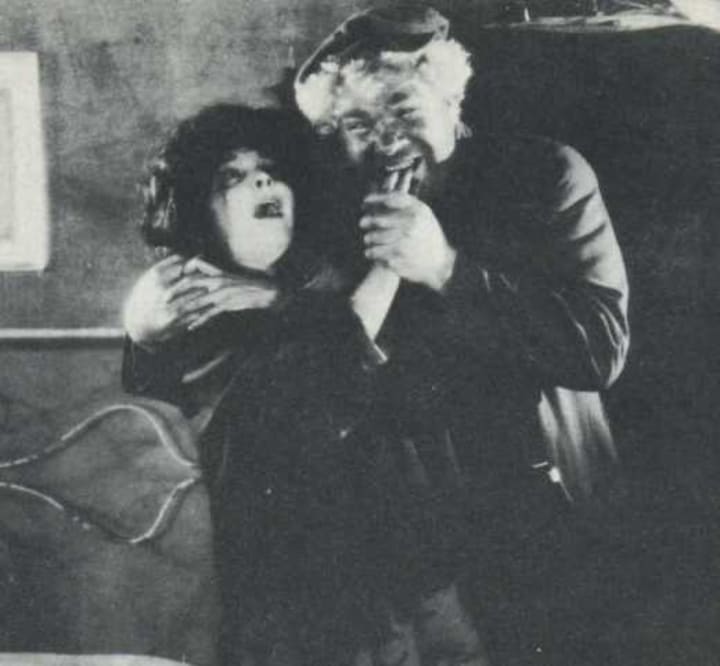
Undoubtedly the greatest loss to cinematic history is the lost footage of this originally eleven hour film. Based on the sprawling, Naturalistic horror epic penned by Frank Norris, Greed is director Erich von Stroheim's gift to the cultural legacy, a film more blackly prescient with each and every passing scene. Telling the story of the blonde giant Mc Teague (played with ferocious and infantile grace by the redoubtable Gibson Gowland), Greed covers the ascent and disintegration of Gowland's character, from his early beginning as the child of hardship and alcoholism at the Big Dipper Mine, to his final sojourn in Death Valley.
Our first taste of McTeague, and his brilliant, white-hot rage, comes about as he tosses a man over the side of a cliff into a stream. He then, amazingly, puts the beak of a bird to his lips; gingerly; a gentle giant is what he is, we now understand. Our next scenes however, play out (at least in the restored version), in the grim confines of a saloon, where McTeague's father (Jack Curtis), a blackly sickening caricature of his handsome son (he also seems to have a black nose from burst blood vessels), is cavorting with a fat, boozy whore; much to the grief of McTeague's long-suffering mother (Tempe Pigott), who tries to coax her drunken, carousing, good-for-nothing husband back home.
He responds by physically attacking her.
McTeague's father predictably dies quite early, and the next turn of events to radically reshape his life is the coming of an itinerant, quack dentist, Dr. "Painless" Potter (Erich von Ritzau), a charlatan in an era of the same. He gives a rousing demonstration of his dental skills to the bored denizens of the mining community. McTeague is called forth from the crowd, and using his near prodigious strength, manages to extract a tooth with his bare fingers. Impressed, the good doctor invites McTeague to become his apprentice.
Becoming well versed in primitive dentistry, McTeague leaves his dear mother behind, setting up shop in dentistry in old San Francisco, circa 1924. It is here he falls in with a buddy, the somewhat grotesque socialist and dog hospital attendant Marcus (Jean Hersholt). Marcus is a nose-picking, teeth-picking nightmare of indecorum; a loud, boisterous and rude fellow; but, seemingly for all that, a good friend to McTeague. His dog grooming place of work is in the back of the tenement he shares with McTeague, with "Old Grannis," "Mrs. Baker," and "Maria Miranda Macapa Had A Flying Squirrel And Let Him Go,"(her incredible name is given thusly); the last being a wretch-like, crone-like cleaning woman, who it is suggested is delusional or crazy (the actress is the amazing Dale Fuller).
Marcus introduces his friend Dr. McTeague to the Sieppe's, a German immigrant family whose father (Chester Conklin) seems to think he is a stand-in for Otto von Bismarck. The doctor and this family become well-acquainted, and, at this point in the film, life, if not comfortable for the characters, promises to be just that, life. There is no sense yet of grim foreboding.
Dr. McTeague has a "dentistry parlor" whose most notable attribute is a bird kept in a gilded cage--the importance of the bird we've already seen foreshadowed in McTeague's handling of the bird at the beginning--contrasting his brutality with his better nature as a blonde "gentle giant." One day, Marcus brings over his cousin, Trina, with whom he is romantically involved. Thus is the audience of Greed introduced to one of the most iconic and haunting images ever to be captured by a photographic motion picture device--the forlorn, melancholy, and doomed visage of actress ZaSu Pitts, "Trina."

Trina is approached, while waiting for the dentist, by Maria, who sells her a cheap lottery ticket that Marcus assures her is "illegal." Marcus tells Trina that Maria is "soft in the head," but Trina buys the ticket anyway. Herein is where tragedy sews the seeds that will reap a bitter harvest.
Falling off a swing, Trina has broken her tooth while at the park with Marcus, whom she was letting push her. She goes back to McTeague a few times to get the tooth fixed, and, while under the influence of ether, or passed out cold, is kissed--essentially molested--by McTeague (who, owing perhaps to the evil lurking in his lineage, has succumbed to the same bestial impulse that destroyed his father).

Eventually, however, the two do become romantically involved.
Marcus, unsuspecting that McTeague and Trina have now begun to see each other, and are falling in love, goes about his life as if nothing has transpired. Events show the twisting and turning, the ebbing of fate in the lives of common, lonely people: Old Grannis (Frank Hayes) and Mrs. Baker (Fannie Midgley) begin a romance by talking to each other through the wall; Maria Miranda Macapa marries the ancient, filthy junkman Zerkow (Cesare Gravina), who lives in a house that looks as if it is at the center of a city landfill.
Her fantasy of having once had a solid gold tea set makes Zerkow believe she is hiding vast wealth. His greed gets the better of him, as, frustrated that she will not tell him where her golden tea set is hidden, he murders her before plunging himself, in a fit of despair, into San Francisco Bay. (Note: Before this, the restored version reveals Maria going slowly mad at the death of her child fathered by Zerkow--she is seen carrying around a miniature wooden casket, wearing mourning attire, with dark circles under her eyes and hollow cheeks. Zerkow seems less bereaved, and carries the thing off in his junk wagon to be buried.)
Thus, in this first killing, we have a rehearsal of the tragedy yet to come.

"Say Trina what's the matter with you and I getting married?" McTeague asks like an innocent child. Trina finally agrees. The unhappiness of their marriage is presaged for the viewer in the metaphorical image of a funeral procession advancing outside the window as they are wed.
Trina then predictably wins the lottery, earning herself the huge sum of five thousand dollars. Cousin Marcus, the ardent socialist, suddenly finds himself awash with greed and regret--after all, if he hadn't, like such a gent, consented to "give" Trina to his good buddy Mac, why, the five thousand dollars would be his! He feels cheated by fate (if not, precisely, by his friend). Marcus steps out of both of their lives. Trina and McTeague are elated. However, unbeknownst to them, their sorrows have just begun.
Marcus and McTeague have sparred already--this is the fault of Marcus, who, bewailing his sorry lot at letting go of the romantic attachments of his cousin, "handing her over, by damn," to McTeague (and, most importantly, LOSING THE FIVE THOUSAND DOLLARS), begins to call home old debts with Mac while both are sitting in a club or tavern with several other portly gentlemen. Mac, unsuspecting initially of Marcus's grievance, at first is contrite and obliging. The scene soon turns into a struggle, with Marcus throwing his knife at McTeague and it sticking in the wall behind him. It is later that Marcus and Mc Teague brawl during a picnic trip, with Marcus biting McTeague's ear, and McTeague breaking Marcus's arm.
(Arms are seen aplenty in Greed, most often sinewy, muscular arms with grasping fingers at the end of them--all plunging their long, desperate digits into piles of yellowed GOLD.)
The Coming Doom
Greed repeats the theme of futile dreams over and over again: the lives of the characters are each lost in a fantasy of material acquisition that will never transpire; never because they are eternal victims of their own personal tragedy--they cannot escape their failure, written into their bodily code, as a karmic, cosmic thing.
Marcus finally decides to depart to become a prospector. He says his goodbyes to Mac and Trina, and they are overjoyed, laughing to see him go. But, much as has been foreshadowed by the image of the greedy cat eyeing the bird in the gilded cage, it is finally Marcus' role to be the cat's paw of a brutal, ironic, and horrific fate.
Marcus reports McTeague for practicing medicine without a license. McTeague, seemingly unaware that he has been breaking the law all of this time, receives a "cease and desist" letter from the government. Instantly, McTeague finds himself out of business, and he and Trina are forced to auction off their possessions (except for their wedding photo, which McTeague salvages for sentimental reasons).
Moving from one rat trap tenement to another, the destitute McTeagues are finally forced to live in the filthy, junk-heaped shack where Zerkow murdered Maria. (In yet another echoing of events, Trina dreams of Maria's dead body coming back to life, perhaps to warn her.)

McTeague begins to wander the streets, growing lazy and apathetic and disheveled. Trina, hoarding her savings and lottery earnings, refuses to give McTeague even a nickel for carfare, making him walk in the rain; humiliating him. McTeague cannot find adequate work, and he becomes more and more wretched as Trina becomes more and more miserly, haggard; she's scolding and condescending. He balances out his frustration, his lack of any hope or support to hang on to, with drinking whiskey.
This brings out the violent, bestial nature that was always, the director seems to suggest, lurking beneath the surface as a natural part of his genetic being, his heritage from his drunken, monstrous, grotesque father. Coming home, stewed and enraged, he begins to gnaw at Trina's fingers, to abuse her until she will cough up some money. He laughs at this petty sadism with the glee of a medieval barbarian (previously, Trina has been seen nervously gnawing her own fingers).
McTeague finally discovers where Trina has hidden her small fortune. He robs her and disappears with the loot.
He is a lost man now. He spends his idle time fishing on the pier, in the company of his little pet bird, who is still in its gilded cage. No one pities him; he seems beyond the sympathy of the world; a derelict monster. A local dentist that wanted to buy the large, golden tooth ornament McTeague formerly took pride in offers him a paltry, insulting sum for it when it is finally offered for sale.
Trina's gnawed fingers become infected; they have to be amputated. She secures a position working as a cleaning lady at an elementary school, living on the premises as well. McTeague finds out where she is living and begs her for help. She shows him the fingers she had to have amputated due to his biting them.

In a drunken fit of rage, he breaks in and murders her on Christmas Eve. Now, he is a man who has sealed his fate. Now he has crushed the sweet flower of his youth, the passion of his life; he has trampled it beneath his boot heel, tearing it to pieces between his rough, ugly, monstrous fingers. He brings to life Oscar Wilde's observation in "Reading Gaol" that: "Each man kills the thing he loves..."
McTeague flees to the high desert, to the edge of Death Valley. There, he meets up with a man who promises him a fortune. However, the deep, animal sense of impending danger steals upon him like a thief in the night, and he leaves without even saying a word.
Meanwhile...
Marcus, a full-on California prospector himself, a man with a scruff of beard, sweat pouring down from his brow, and a Stetson hat, sees the want adds for "Dr. McTeague." McTeague has murdered his once-beloved cousin Trina; more importantly, he has absconded with the five thousand dollars.
Against the warnings of the sheriff, who is leading a posse to capture McTeague, Marcus heads out into Death Valley in pursuit. He finds McTeague leading a mule, with a huge canteen of water and a sack full of money. They both struggle. At one point, the mule breaks and runs. Unaccountably, McTeague tells Marcus, "He's eaten some locoweed. It'd be a shame to make him suffer." Like a fool, Marcus shoots the animal. The water, the only water for miles and miles, spills out onto the desert floor. The two men have signed their own death warrants.

They grapple. Amazingly enough, it is over the bitterness of money; of greed. McTeague kills Marcus, only to find that, in the ensuing struggle, Marcus has handcuffed McTeague to himself. Now McTeague is handcuffed to the corpse of the man he has just murdered. He is in the middle of Death Valley, with no water, and a corpse, like the proverbial albatross, to drag along with him. Realizing the utter hopelessness of the situation, he sits down and waits for death to claim him. In his lap rests the golden birdcage.
He slips a hand inside, takes the bird out. Tenderly he kisses the little thing. Then, he sets it free. It is the symbol of the soul being set free, escaping from the golden prison of want, of desire. The sun bleaches the desert white with the passage of minutes, hours, days; it will soon bleach the bones of the two men, once veritable brothers, now dead victims of their own stupidity. One day, someone may discover them. Their tortured epitaph will be: FINALLY EQUAL.
(For, neither of them now have anything for the other to covet.)
Greed is a motion picture experience of titanic proportions, a vast, sprawling, Greek tragedy played out in the years preceding the Great Depression, the "Dirty Thirties." It is more than a historical window into a bygone era, it's an examination of tortured, tragic lives wasted in circles of fantasy and want, spinning webs of ill-omened folly, karmic debts called in because of the relentless lust for something, anything to give life meaning, assurance; to stave off the impending doom that lurks, like the cursed blood flowing through the arteries and veins of McTeague, beneath the surface of the dull, tenement life of early Twentieth century San Francisco. Their doom is as real as the ticking minutes counting down the clock, their moments recorded on film and saved for boring posterity, so we can see the denouement of their dreams, as time crumbles and destroys ALL things before the relentless onslaught of the ages.
And Trina, and Mac, and Marcus, and Maria, even Zerkow--these stories are just ONE story, one American tale, lost in the mists of antiquity; but captured, oh my yes, in the pages of Frank Norris' classic of American literature; in each frame of Erich von Stroheim's amazing, horrific, cinematic ghost story.
Our dreams end in death; the final words upon our lips may be those of despair. We may, as McTeague, recognize the capriciousness of fate, the futility of swimming against the tide of what lies within, when our final destiny seems written in the stars. We may be divinely enlightened creatures, but, within us the beast still lurks, waits; hungry, forever hungry; waiting, hoping, praying; dreaming of things men ought not to dare to dream.
And always, eternally, suffused with GREED.
Greed is in the public domain, and can be viewed at archive.org in a version with the missing scenes reconstructed with stills.
About the Creator
Tom Baker
Author of Haunted Indianapolis, Indiana Ghost Folklore, Midwest Maniacs, Midwest UFOs and Beyond, Scary Urban Legends, 50 Famous Fables and Folk Tales, and Notorious Crimes of the Upper Midwest.: http://tombakerbooks.weebly.com






Comments
There are no comments for this story
Be the first to respond and start the conversation.